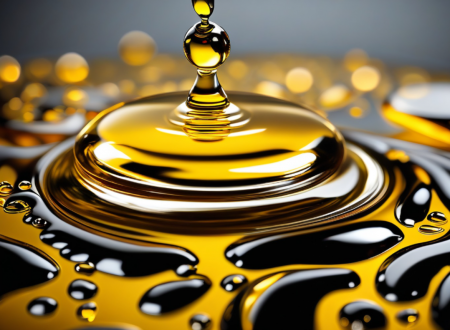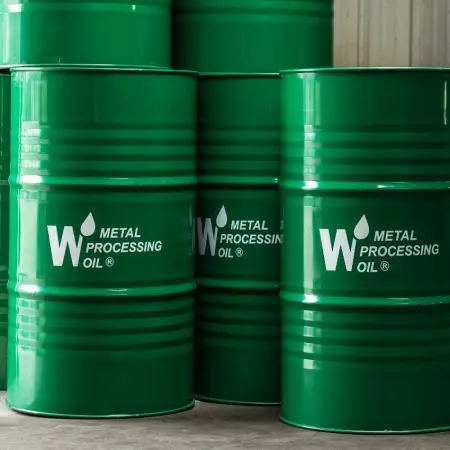5 Warning Signs of Hydraulic Oil Deterioration and How to Fix Them|Ignoring These Issues May Cost You More
Industrial lubricants - hydraulic oil AW32, AW46, AW68
In automated and industrial machinery, the hydraulic system is often regarded as the heart of the operation—and hydraulic oil is the lifeblood that keeps it running smoothly. Unfortunately, many users overlook the condition of their hydraulic oil until system issues or machine failures arise. By then, the fluid may have already deteriorated, potentially causing serious damage to expensive equipment.
In this article, we’ll explore the five most common signs that hydraulic oil has degraded, and how to handle each situation to keep your equipment operating efficiently and safely.
Darkened or Cloudy Oil Indicates Oxidation or Contamination
A quick visual inspection can reveal early signs of oil degradation. Fresh hydraulic oil typically appears clear or pale yellow. If the oil darkens to tea-brown or even black, it’s a strong indicator of oxidation or contamination by metal particles, dust, or foreign oil. In more serious cases, the oil may turn milky or cloudy—this often means that water has entered the system and caused emulsification, severely impacting the oil’s ability to maintain pressure and provide proper lubrication.
Foamy or Milky Surface Suggests Air or Water Ingress
Excessive foaming or a frothy, milky appearance on the surface of the hydraulic oil can signal that air or moisture has entered the system. This is commonly due to poor tank sealing, suction line leaks, or mixing incompatible oils. Not only does foaming reduce pressure stability, but it also accelerates oil oxidation and leads to premature breakdown. In such cases, the system should be checked for leaks, and defoaming or dehydration equipment may be necessary.
Burnt or Sour Smell Points to Overheating or Thermal Breakdown
If you notice a pungent, sour, or burnt odor coming from the hydraulic system, it’s likely that the oil has been exposed to excessive heat or oxidation. This could be caused by poor cooling efficiency, clogged radiators, or continuous high-load operation. The heat causes the oil to degrade, potentially producing acidic compounds and sludge. This not only reduces performance but also corrodes seals, valves, and pumps. Check your cooling system immediately and consider switching to high-temperature-resistant hydraulic oils.
Abnormal Pressure Levels May Be Caused by Viscosity Changes
When pressure output drops or actuator movement slows under normal loads, oil viscosity may be to blame. Over time, fluid viscosity can thin due to temperature rise or improper oil mixing, while cold environments or aged oils may cause it to thicken. These changes affect the oil film’s stability and the system’s ability to transfer power effectively. We recommend regular viscosity testing and ensuring you're using the correct viscosity grade—such as VG32, VG46, or VG68—in accordance with your equipment’s specifications.
Frequent Filter Clogging Signals Heavy Contamination
If your filters are clogging more often than usual, it’s a sign that the oil contains high levels of sludge, varnish, or solid contaminants. These microscopic particles can accumulate in the filter elements or clog flow paths, leading to pressure fluctuations and accelerated wear on system components. In this case, not only should the filters be replaced, but the entire system—including tanks and lines—should be flushed, and new clean oil introduced.
Customer Case: Emulsified Hydraulic Oil Shuts Down Production Line
At one of our client sites—a precision automotive parts manufacturer—the production line suddenly experienced erratic pressure and abnormal noise during operation. Upon inspection, the oil was found to be milky white with heavy foam, indicating severe emulsification. It turned out that water had entered the hydraulic system due to rainwater seeping through a poorly sealed tank cover. Since oil condition checks weren’t performed regularly, and oil changes were delayed, the plant had to halt operations for two full days to clean the system and refill new oil. The financial loss and production delay served as a powerful reminder of why routine oil condition monitoring is essential.
Hai Lu Jya He|Your Trusted Source for Certified Hydraulic Oil in Taiwan
Hai Lu Jya He is the exclusive distributor in Taiwan for Japan’s MORESCO. With years of experience, we provide industries across Taiwan with reliable hydraulic oil solutions and professional oil management support.
Our hydraulic oils are certified with EU REACH and come with SDS safety data sheets and complete technical documentation, ensuring safe and compliant use in all industrial applications.
Besides the well-known WILL AW series, we also supply leading global brands such as CPC, Mobil™, and Shell™, suitable for CNC machines, die casting equipment, and injection molding systems.
If you need assistance choosing the right hydraulic oil or evaluating system needs, feel free to call us at +886-4-25332210, or fill out the form below. Our experts are ready to support your maintenance and performance goals.
- Recommend Product
WILL Hydraulic Oil AW-32
High-Performance Anti-wear Oils ISO 32
WILL AW-32 Hydraulic Oil is a shear-stable and high-quality lubricant which is formulated with...
DetailsWILL Hydraulic Oil AW-46
High-Performance Anti-wear Oils ISO 46
WILL AW-46 Hydraulic Oil is a high quality lubricant manufactured from refined paraffin base...
DetailsWILL Hydraulic Oil AW-68
High-Performance Anti-wear Oils ISO 68
WILL Hydraulic Oil AW-68 is a top-tier industrial lubricant, specifically formulated to deliver...
Details



